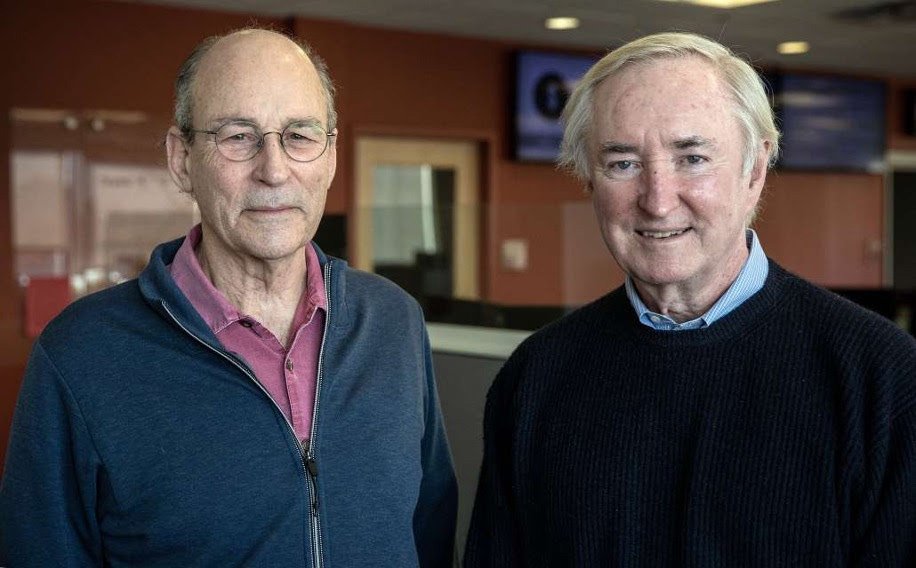R-E-S-P-E-C-T
Dear Leading Ladies,
Tracy Kidder doesn't walk by homeless people on the street anymore. He doesn’t act as if they are invisible. He makes eye contact. He speaks to them. And he usually gives them money.
He doesn’t care what they are going to spend it on. Maybe it will be drugs instead of food or clothing. Doesn't matter. He's a changed man. Researching his most recent book, Rough Sleepers, is what did it. The Pulitzer Prize-winning author of a dozen non-fiction books spent five years with Dr. Jim O'Connell, a Harvard-trained physician who has devoted his entire medical career to caring for Boston's homeless as head of the Boston Health Care for the Homeless Program.
From the doctor, Kidder learned to know these people, to listen to them, and to hear their stories. Moreover, to treat them with respect.
Tracy Kidder on Dr. Jim O’Connell
A couple of us had the good fortune to hear Kidder speak last week at the Sweetser Lecture Series in Wakefield. It was clear how much writing the book and getting to know Jim O’Connell and the homeless patients meant to the author.
O’Connell, Kidder said, found the work he loved and felt very lucky for it. The doctor doesn’t think of himself as a saint, religious or secular, but merely as a man who is doing what he loves and, yes, pleased that it might do some good.
O’Connell holds no illusion that his work solves the problems of the homeless, Kidder emphasized. Homelessness in our country, he believes, is complicated and requires commitment, lots of money, and big changes. O’Connell sees himself as taking care of people while we wait for those big and necessary changes. ”It’s not solving homelessness, but it’s caring, as best we can, for those who are currently suffering,” he says of the program he has led for the past 40+ years.
Tracy Kidder and Dr. O’Connell. Photo credit: Robin Lubbock/WBUR
Accompanying O’Connell and his street team as they treated the rough sleepers (a term used to describe those who live on the streets), Kidder learned to see the pervasive mental health issues that plague homeless men and women. Many suffered early trauma, and abusive childhoods, compounded by the trauma of now living on the streets. Living outside of society, with no dependable source of food or place to sleep, without stable emotional support or dependable companionship, can cause a person to fall apart. Kidder noted the recent studies on loneliness and what it can do to a person. Add to this being invisible, erased from the human mural of life. The solution, Kidder learned, is not just providing housing. In fact, many may lack the skills to care for themselves in an indoor situation or don’t have the social skills to share a space. Isolation and loneliness may plague them in their current situation, but an indoor situation may be more frightening. Support, understanding, and skill training is needed for many to make the transition.
Who are our homeless?
With O’Connell, Kidder met people from a variety of backgrounds on the streets. There was a former MIT professor who had a psychotic break and ended up homeless, where he developed a small melanoma on his scalp that could have been easily treated had he shown it to a doctor. Instead, he hid it under a hat until he grew so large it protruded and made a huge bump in his hat. By the time Dr. O’Connell saw it, it was inoperable and terminal.
A woman addict who last saw her children 25 years ago wanted her photo taken in case her children ever came looking for her. She got all dressed up for the occasion because she didn’t want to be erased, according to Kidder’s remembrance of her.
Yet another street patient insisted he’d been a judge, always dressed the part and made constitutional pronouncements, though no one could find any evidence he had been either a judge or a lawyer.
Gaining trust, giving respect
From the beginning of his work with the homeless, O’Connell learned the importance of gaining the trust of his patients. A very wise nurse took his stethoscope from around his neck and assigned him to wash the feet of men who came into the clinic at the Pine Street Inn. Washing their feet, with all its biblical connotations, was an intimate, caring act that smashed the hierarchy and encouraged trust on both sides.
After reading the book and hearing Kidder speak, it is easy to imagine that O’Connell is uniquely suited for the job he took on. As a young man, he wandered around a bit after college wondering what to do with his life. He spent some time tending bar in Newport, RI, studying philosophy in Cambridge, England, teaching school in Hawaii, creating a kind of commune in Vermont. It seems he was always someone who could understand that there are different paths in life and that our choices can be foiled by bad luck. In today’s lingo, Jim O’Connell is not a judgy person. He doesn’t need to work at it. It is who he is. As Kidder put it, Jim O’Connell approaches everyone as someone he is “eventually going to like.”
How lucky the rough sleepers of Boston are, and have been, to have Dr. Jim O’Connell – Jim to them – caring for them, listening to them, respecting them. Talk about Boston’s finest!
Therese (she/her/hers)
Judy (she/her/hers)
Didi (she/her/hers)
Leading Ladies Executive Team

